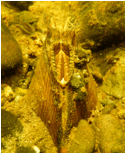Home → Fish & Wildlife → Wildlife → Species Information → Invertebrates → Rare Freshwater Mussels
Rare Freshwater Mussels

Yellow Lampmussel
Photo by Ethan Nedeau
As filter-feeders, freshwater mussels provide a vital service to Maine’s lakes, ponds, rivers and streams by removing suspended particles such as algae, bacteria, and detritus from the water column. Because they constantly filter large volumes of water, reside in the benthic substrate, can’t leave their surroundings, and live a long time (more than 100 years for some species!), freshwater mussels are sensitive to contaminants and changes in their environment. Consequently, they are a valuable indicator of water quality and aquatic ecosystem health, but they also are one of the most imperiled groups of animals in the country. Of the nearly 300 species of freshwater mussels found in the United States, more than a third have already vanished or are in danger of extinction and over 75% are listed as Endangered, Threatened, or Special Concern on a state level. These dramatic declines have been caused largely by the degradation and loss of mussel habitat from pollution, dams, and the channelization and sedimentation of once clean, free-flowing rivers and streams. In some parts of the country, the accidental introduction of a prolific foreign competitor, the zebra mussel, is also jeopardizing many populations.



Strip of photos from top to bottom (all photos by Ethan Nedeau):
Yellow Lampmussel
Tidewater Mucket
Brook Floater
Maine’s freshwater mussel fauna has fared relatively better than that of many states. We haven’t lost any species, our freshwater habitats are reasonably clean, and the zebra mussel has not yet found its way into our waterways. Still, of our 10 native species, three (Yellow Lampmussel, Tidewater Mucket, Brook Floater) are currently listed as Threatened under the Maine Endangered Species Act and one (Creeper) is considered of Special Concern. The Yellow Lampmussel and Tidewater Mucket are listed because of their restricted distribution in Maine – both are found only in the Penobscot, St. George and lower Kennebec River watersheds. Although some large populations of both species exist, they typically occur in low densities wherever they are found. The Brook Floater is one of the rarest freshwater mussels in the Northeast. Rangewide concerns for this species include very low population densities, fragmented distributions, and limited or no evidence of recruitment in some populations.
Fortunately, compared to most states within the range of these rare mussels, Maine hosts some of the best remaining populations and may be a last stronghold. MDIFW is committed to its responsibility of conserving these rare species for the future and regularly works to ensure their habitats are protected and recovery and relocation plans are put in place when projects such as dam removals, bridge construction or dredging pose a threat.
More information on Maine's mussels can be found in The Freshwater Mussels of Maine (PDF) (Nedeau et al. 2000), Freshwater Mussels of Maine Poster (PDF), or by visiting the state list of Endangered, Threatened, or Special Concern invertebrates.
Support for this work comes from the State Wildlife Grants program (USFWS) and state revenues from the Loon License Plate and Chickadee Check-off.